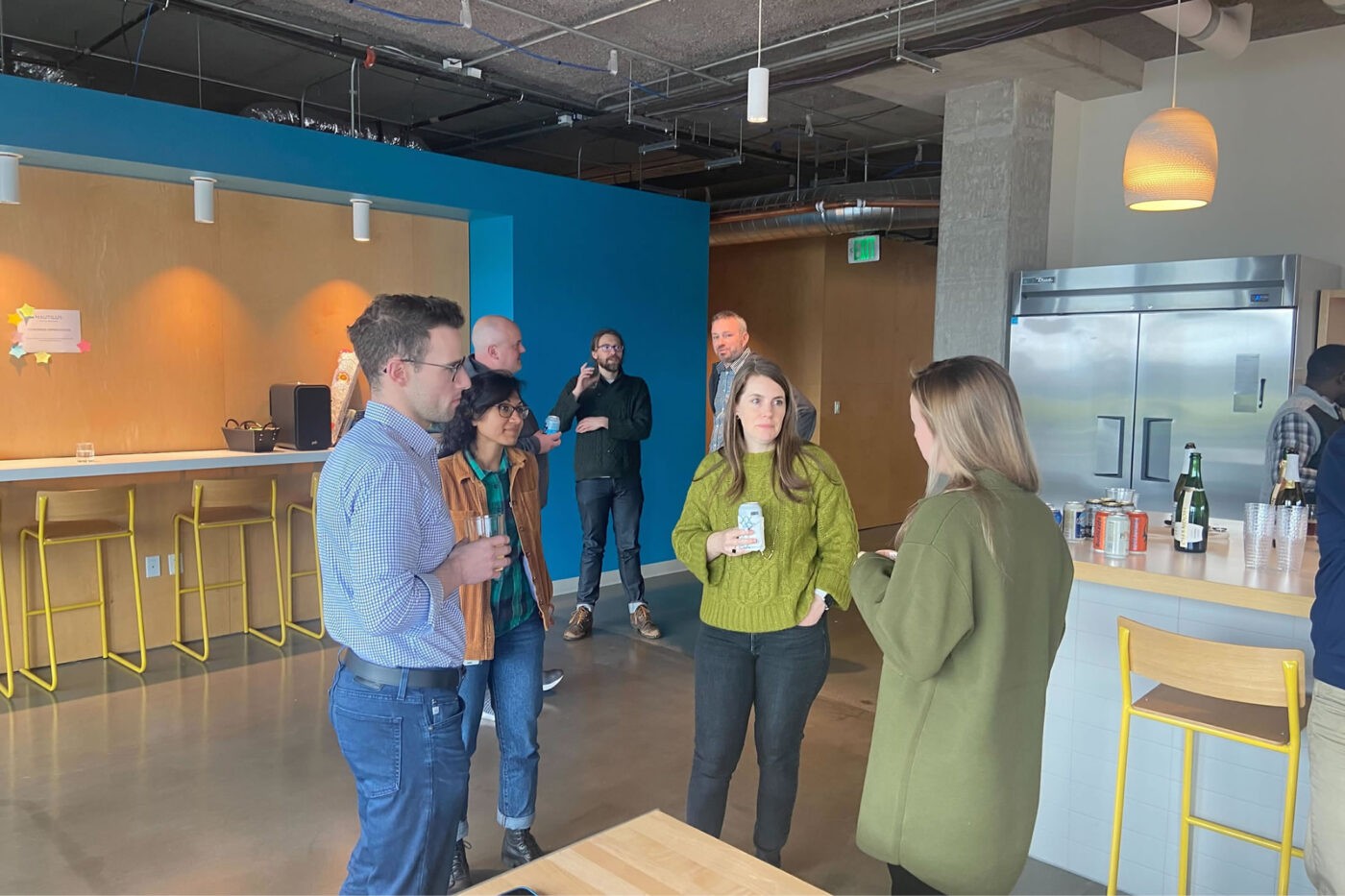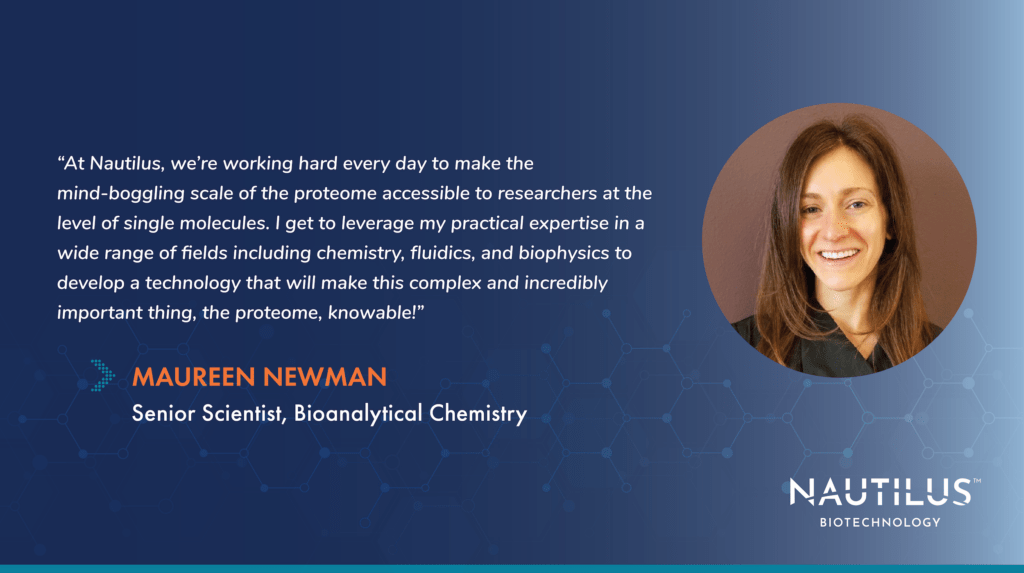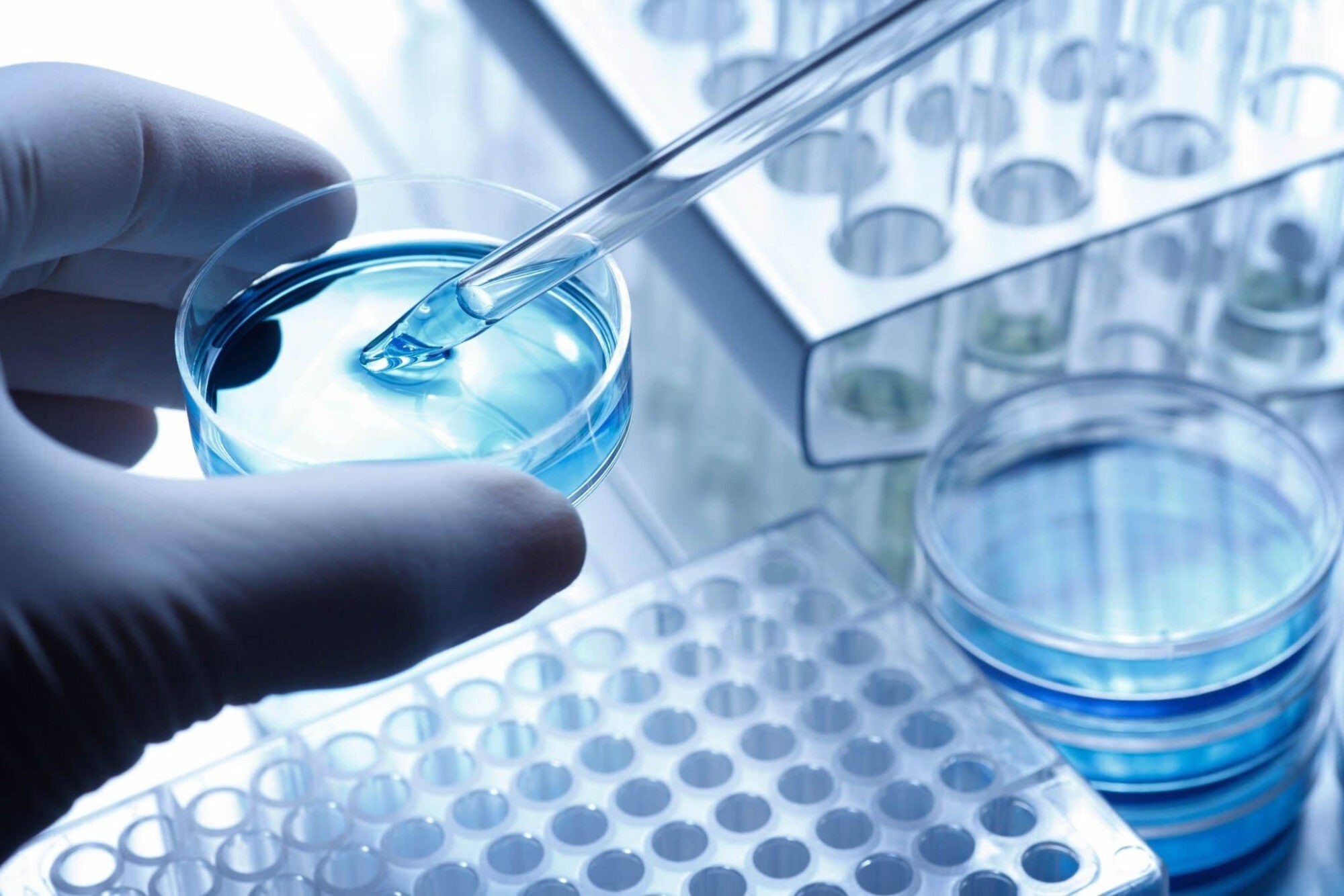
Interview with Maureen Newman, Nautilus Senior Scientist, Bioanalytical Chemistry

Tyler Ford
January 23, 2024

Maureen Newman, Nautilus Senior Scientist, Bioanalytical Chemistry, has had a keen interest in science since way back in elementary school when she was astounded to learn that invisible things called atoms make up everything around us. While it was difficult to understand how the atoms she could not see formed the fundamental basis for everything around her, she was driven to learn more about them.
A strong desire to understand the unknown and even to make it beneficial has motivated Maureen throughout her career. At Nautilus, that motivation continues to drive her while she works with the team to develop a platform capable of quantifying single protein molecules at the mind-blowing scale of the proteome at a time when there are few single-molecule technologies with the potential to fill that need.
Read on to learn more about Maureen and how she leverages her curiosity in her work at Nautilus.
What were your first experiences in science and research like?
I had my first in-depth experiences with science in high school. While we learned about things like atoms in elementary school and the basics of biology in middle school, it wasn’t until high school that I was given the opportunity to dive deep and really begin to understand scientific concepts. I consumed myself with reading textbooks and developing little tricks to help me remember the concepts—especially those I had to commit to memory because I couldn’t see or experience them in the scale of real life. For instance, I would personify atoms and their attachments to one another to remember how organic chemistry reactions worked.
Because I didn’t have real-world exposure to scientists, I didn’t think there was a career for me in science unless I wanted to be a doctor, a veterinarian, or a science teacher. However, my father (who supervises nuclear reactor operations) and an awesome high school chemistry teacher encouraged me to pursue STEM because they saw I had a real knack for it. It was their support that made me realize that my interest in science could be made into a career.
I was able to nurture my love for science through a variety of fun and formative experiences. For example, each year of high school, I participated in a competition where I had the opportunity to learn about and present my findings on some aspect of nuclear energy to a panel of judges (nuclear energy was important to my hometown because there were a few reactors nearby). After our presentations, we used interactive activities to share what we learned with the public. I thoroughly enjoyed these activities because they helped me see how science and engineering concepts interface with real people.
Later research experiences have excited me most when they are at the intersection of the unknown or invisible and the tangible or practical. For example, as a biomedical engineering undergrad, I worked to help build an understanding of the nebulous process through which neural stem cells differentiate into the cells of the nervous system. This involved engineering fluid flow over support cells so that the cells’ growth media interacted with them in a way that altered how they created extracellular matrix and affected how stem cells differentiated. Ultimately, this was a very physical, practical way of altering something that is difficult to understand at the outset – stem cell fate.
How have these early experiences translated to your work now?
In my professional career, I’ve remained at the interface of the unknown and the tangible. Much of my graduate and early career work involved studying how individual proteins (miniscule and largely intangible entities) impact the cells maintaining bone homeostasis and how we can manipulate those interactions through engineering strategies – things that could have a very concrete impact on me as a woman and an athlete who is at risk for osteoporosis.
At Nautilus, we’re working hard every day to make the mind-boggling scale of the proteome accessible to researchers at the level of single molecules. I get to leverage my practical expertise in a wide range of fields including chemistry, fluidics, and biophysics to develop a technology that will make this complex and incredibly important thing, the proteome, knowable!
What applications of the NautilusTM Proteome Analysis Platform are you particularly excited about?
This ties into my love for trying to understand the unknown. There are a ton of people walking around feeling horrible and not knowing why. If we succeed at providing these folks with proteomes as easily as we can sequence their genomes, we can fuel research that leads to diagnostics that suggest what proteins are making these people feel bad. Sometimes just knowing what sort of disease or condition you’re up against provides such relief. Hopefully the knowledge will also fuel rapid development of therapies targeting the underlying proteins.
What do you enjoy about working at Nautilus?
In addition to the scope of our product development efforts, I really enjoy the nerdy friendships I’ve made with my coworkers. Nautilus has also provided me with room for work-life balance that has made it easy to get a good feeling for how things work here. Now that I have the lay of the land, I’m being given opportunities for professional development in the form of leading research projects that I and the leadership consider valuable. Finally, I like the way we conceptualize projects here. We break them into quarterly chunks that are difficult but achievable, help us feel a sense of accomplishment, and help make the massive challenges of technology development manageable.
MORE ARTICLES
